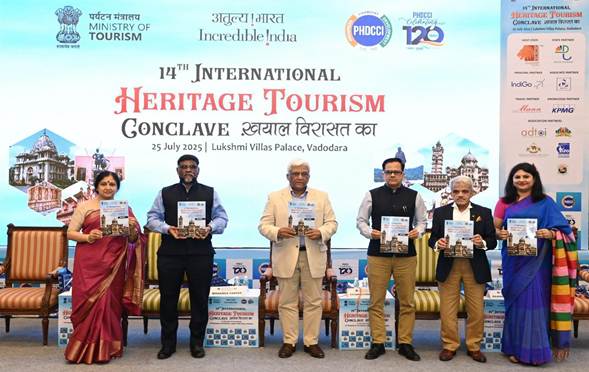The PHD Chamber of Commerce and Industry (PHDCCI) hosted its 14th International Heritage Tourism Conclave on July 25, at the majestic Lukshmi Villas Palace in Vadodara, in collaboration with the Ministry of Tourism, Government of India, Gujarat Tourism, Delhi Tourism, IndiGo, and IRCTC. Themed “Cherishing Heritage”, the event served as a dynamic platform for dialogue and advocacy to advance heritage-led tourism in India.
The conclave brought together policymakers, royal dignitaries, diplomats, conservation architects, tourism professionals, food historians, and cultural custodians to explore how India’s rich heritage can drive economic revitalization, community development, and cultural preservation. Rajender Kumar, Secretary of Tourism, Civil Aviation, Devasthanam Management & Pilgrimage, Government of Gujarat, inaugurated the event, highlighting Gujarat’s vision for inclusive heritage tourism. “We are not only restoring monuments but also ensuring direct benefits to local communities through jobs, infrastructure, and cultural pride,” he stated.
His Highness Samarjitsinh Gaekwad, Maharaja of Baroda, emphasized the need for heritage to remain relevant for future generations, saying, “Heritage must live on through connection with future generations, not just nostalgia.” Mohamed Farouk, Regional Director of India Tourism Mumbai, underscored the Ministry of Tourism’s commitment through initiatives like Swadesh Darshan 2.0 and PRASHAD, which connect destinations through cuisine, folklore, crafts, and festivals.
Rajan Sehgal, Co-Chair of PHDCCI’s Tourism Committee, delivered the theme address, stating, “Heritage tourism is about identity, economy, and empowerment. Our aim is to catalyze policy innovation and foster public-private partnerships.” The event commenced with a ceremonial Saraswati Vandana performed by students of Maharaja Sayajirao University, setting a cultural tone, followed by the launch of the PHDCCI-KPMG Heritage Tourism Report, which emphasized the role of public-private partnerships in revitalizing heritage assets.
Discussions covered a range of topics, including Gujarat’s community-centric model, which focuses on artisan engagement and adaptive reuse of built heritage. The Shekhawati legacy session addressed challenges and incentives for private heritage owners, while a culinary tourism segment, featuring Prof. Pushpesh Pant and renowned chefs, highlighted food as a cultural and tourism asset. A traditional Gujarati lunch, “Bapor nu Bhojan,” curated by Chef Pritesh Raut, showcased Gujarat’s culinary heritage.
A case study on Champaner-Pavagadh, presented by Dr. Amita Sinha, focused on community tourism and repositioning UNESCO sites. The role of women as cultural custodians was emphasized by HH Radhikaraje Gaekwad and HH Kadambaridevi Jadeja, who called for support for women-led tourism ventures. Sessions on architecture and storytelling advocated for the use of technology and inclusive narratives to engage younger audiences, while heritage transport discussions highlighted vintage mobility as a unique tourism experience, urging restoration grants.
The conclave facilitated over 25 B2B meetings, connecting tourism boards, hospitality leaders, and cultural entrepreneurs to foster cross-sector collaborations. A curated contemporary art showcase and a guided heritage walk of Lukshmi Villas Palace provided immersive experiences for attendees.










